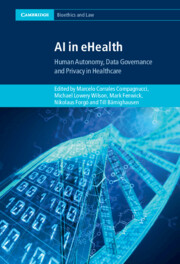Book contents
- AI in eHealth
- Cambridge Bioethics and Law
- AI in eHealth
- Copyright page
- Contents
- Contributors
- Preface
- Acronyms
- 1 Mapping the Digital Healthcare Revolution
- Part I Platforms, Apps and Digital Health
- Part II Trust and Design
- Part III Knowledge, Risk and Control
- Part IV Balancing Regulation, Innovation and Ethics
- 11 Doctors Without Borders? The Law Applicable to Cross-Border eHealth Services and AI-Based Medicine
- 12 Organisational Readiness for the Adoption of Artificial Intelligence in Hospitals
- 13 Regulating the ‘Benefits’ of eHealth
- 14 Data Protection Implications of Forensic Genealogy
- 15 Health Research, eHealth, and Learning Healthcare Systems
- Index
- Cambridge Bioethics and Law
- References
13 - Regulating the ‘Benefits’ of eHealth
Information Disclosure Duties in the Age of AI
from Part IV - Balancing Regulation, Innovation and Ethics
Published online by Cambridge University Press: 08 September 2022
- AI in eHealth
- Cambridge Bioethics and Law
- AI in eHealth
- Copyright page
- Contents
- Contributors
- Preface
- Acronyms
- 1 Mapping the Digital Healthcare Revolution
- Part I Platforms, Apps and Digital Health
- Part II Trust and Design
- Part III Knowledge, Risk and Control
- Part IV Balancing Regulation, Innovation and Ethics
- 11 Doctors Without Borders? The Law Applicable to Cross-Border eHealth Services and AI-Based Medicine
- 12 Organisational Readiness for the Adoption of Artificial Intelligence in Hospitals
- 13 Regulating the ‘Benefits’ of eHealth
- 14 Data Protection Implications of Forensic Genealogy
- 15 Health Research, eHealth, and Learning Healthcare Systems
- Index
- Cambridge Bioethics and Law
- References
Summary
Much legal and ethical attention in the area of eHealth focuses on the risks of health data processing ‘going wrong’ – a breach of privacy occurs, data is misused in an unauthorised way, or the analysis of data gives a faulty result. However, significant challenges are also posed by such processing where the data processing ‘goes to plan’ – the analysis gives the correct result in the way intended. Such challenges stem both from the nature of the information generated, and the new contexts in which this occurs. Thus, Big Data analysis may produce ever more information in relation to a person’s future health, usually of a probabilistic nature. In what situations should such information be returned to the subject (bearing in mind also that the decision-maker increasingly will be an entity outside the traditional health care context)? This chapter considers key ethical considerations that arise in such cases, and how well the law – through liability rules for harm, caused by failure to disclose, or by unjustified disclosure – is equipped to respond.
- Type
- Chapter
- Information
- AI in eHealthHuman Autonomy, Data Governance and Privacy in Healthcare, pp. 378 - 400Publisher: Cambridge University PressPrint publication year: 2022



